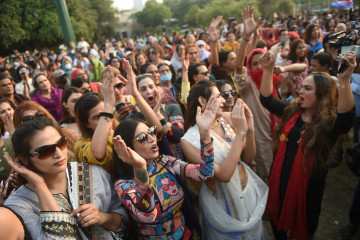

"We are human beings and have the same heart, the same feelings, and the same emotions that you have."
These are the words of Shahzadi Rai, who along with hundreds of transgender activists and supporters protested in Pakistan’s southern city of Karachi to campaign for equal rights and raise awareness of discrimination against the community.
The protest comes days after the local release of Joyland, a Pakistani movie about a married man's affair with a transgender woman that has stirred up a lot of controversy in the country and was initially banned following complaints by Islamist groups.
"The time has come for us to tell people who we are and what our demands are," Shahzadi Rai told AFP.
|
Lauded by critics, awarded the Jury Prize at Cannes, and nominated as Pakistan's entry for next year's Academy Awards, Joyland tells the story of the youngest son of a patriarchal Punjabi family who falls in love with a brash transgender dancer. Their affair exposes the hypocrisy of relationships throughout a multi-generational family struggling with sexuality and the clash of tradition and modernity.
The movie was cleared by Pakistan's board of censors in August and was due to screen in cinemas this month, but the ministry of information banned it following objections from right-wing Islamist groups and individuals.
The ministry said it was "clearly repugnant to the norms of decency and morality", sparking ridicule from the movie's supporters on social media, who speculated the officials had acted without even seeing the film.
In a statement, director Saim Sadiq said he was "gutted" by the decision, adding the movie's principals "fully intend to raise our voice against this grave injustice".
|
The ban was later reversed and the film was allowed to be screened, but the damage had already been done and Pakistan's transgender community felt it was once again time to speak up.
Despite a rich history in South Asia, most transgender Pakistanis are forced to live on the fringes of society – often resorting to begging, dancing at weddings, or sex work for survival.
They were then given the right to vote, equal access to employment and education, and the right to identify their gender on the national identity card through hard-won legislation in 2018. But that law is now being threatened by some legislators and right-wing religious parties who claim it is a sign of encroaching Western values and promotes homosexuality.
Protesters chanted and sang while carrying placards calling for the rights of the transgender community.
A prominent slogan was "Women, life and liberty" – a rallying call for the current women-led protests in Iran.
"No matter what our gender... we should get equal rights," popular Pakistan classical dancer Sheema Kirmani said.
Participants gave fiery speeches and put on lively dance performances, and also held a symbolic funeral for transgender victims of violence.
Rights group Amnesty International said it was part of a "deep-rooted and persistent pushback to ensuring their equal place in society".
According to the rights group, 18 transgender people have been killed in Pakistan since October last year.
Transgender people were legally recognised as a "third gender" by a landmark Supreme.
Report from AFP





 Follow the Middle East's top stories in English at The New Arab on Google News
Follow the Middle East's top stories in English at The New Arab on Google News


